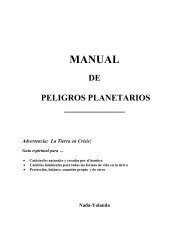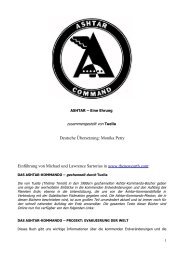ALIEN INTERVIEW - THE NEW EARTH - Earth Changes and The ...
ALIEN INTERVIEW - THE NEW EARTH - Earth Changes and The ...
ALIEN INTERVIEW - THE NEW EARTH - Earth Changes and The ...
Create successful ePaper yourself
Turn your PDF publications into a flip-book with our unique Google optimized e-Paper software.
events <strong>and</strong> phenomena in such terms. In many cultures, magic is under pressure from, <strong>and</strong><br />
in competition with, scientific <strong>and</strong> religious conceptual systems.<br />
Adherents to magic believe that it may work by one or more of the following basic principles:<br />
• Natural forces that cannot be detected by science at present, <strong>and</strong> in fact may not<br />
be detectable at all. <strong>The</strong>se magical forces are said to exist in addition to <strong>and</strong><br />
alongside the four fundamental forces of nature: gravity, electromagnetism, the<br />
strong force <strong>and</strong> the weak force.<br />
• Intervention of spirits similar to these hypothetical natural forces, but with their<br />
own consciousness <strong>and</strong> intelligence. Believers in spirits will often describe a whole<br />
cosmos of beings of many different kinds, sometimes organized into a hierarchy.<br />
Aleister Crowley preferred the spelling magick, defining it as "the science <strong>and</strong> art of causing<br />
change to occur in conformity with the will." By this, he included "mundane" acts of will as<br />
well as ritual magic. In Magick in <strong>The</strong>ory <strong>and</strong> Practice, Chapter XIV, Crowley says:<br />
"What is a Magical Operation? It may be defined as any event in nature which is<br />
brought to pass by Will. We must not exclude potato-growing or banking from our<br />
definition. Let us take a very simple example of a Magical Act: that of a man blowing<br />
his nose." "<br />
-- Reference: Wikipedia.org<br />
67 "...they will capture other IS-BEs as slaves..."<br />
"<strong>The</strong> word slave in the English language originates from the Middle English sclave, from the<br />
Old French esclave, the Medieval Latin sclavus, the early Greek sklabos, from sklabenoi,<br />
Slavs, of Slavic origin; akin to Old Russian Slovene, an East Slavic tribe. <strong>The</strong> term sclavus<br />
originally referred to the Slavs of Eastern <strong>and</strong> Central Europe, as many of these people had<br />
been captured <strong>and</strong> then sold as slaves by Otto the Great <strong>and</strong> his successors. <strong>The</strong> former<br />
Latin word for "slave" was servus (cf. English serf).<br />
<strong>The</strong> evidence for slavery predates written records. It can be found in almost all cultures <strong>and</strong><br />
continents. Slavery can be traced to the earliest records, such as the Code of Hammurabi in<br />
Mesopotamia (~1800 BC), which refers to slavery as an already established institution. In<br />
important exception occurred under the reign of the Achaemenid Empire in Persia in 500<br />
BC. <strong>The</strong> forced labor of women in some ancient <strong>and</strong> modern cultures may also be identified<br />
as slavery. Slavery, in this case, includes sexual services.<br />
Historically, most slaves were captured in wars or kidnapped in isolated raids, but some<br />
persons were sold into slavery by their parents, or by themselves, as a means of surviving<br />
extreme conditions. Most slaves were born into that status, to parents who were enslaved.<br />
Ancient Warfare often resulted in slavery for prisoners <strong>and</strong> their families, who were either<br />
killed, ransomed or sold as slaves. Captives were often considered the property of those<br />
who captured them <strong>and</strong> were looked upon as a prize of war. Slavery may originally have<br />
been more humane than simply executing those who would return to fight if they were freed,<br />
but the effect led to widespread enslavement of particular groups of people. Those captured<br />
sometimes differed in ethnicity, nationality, religion, or race from their enslavers, but often<br />
were the same as the captors. <strong>The</strong> dominant group in an area might take captives <strong>and</strong> turn<br />
them into slaves with little fear of suffering the like fate. <strong>The</strong> possibility always existed of<br />
200





